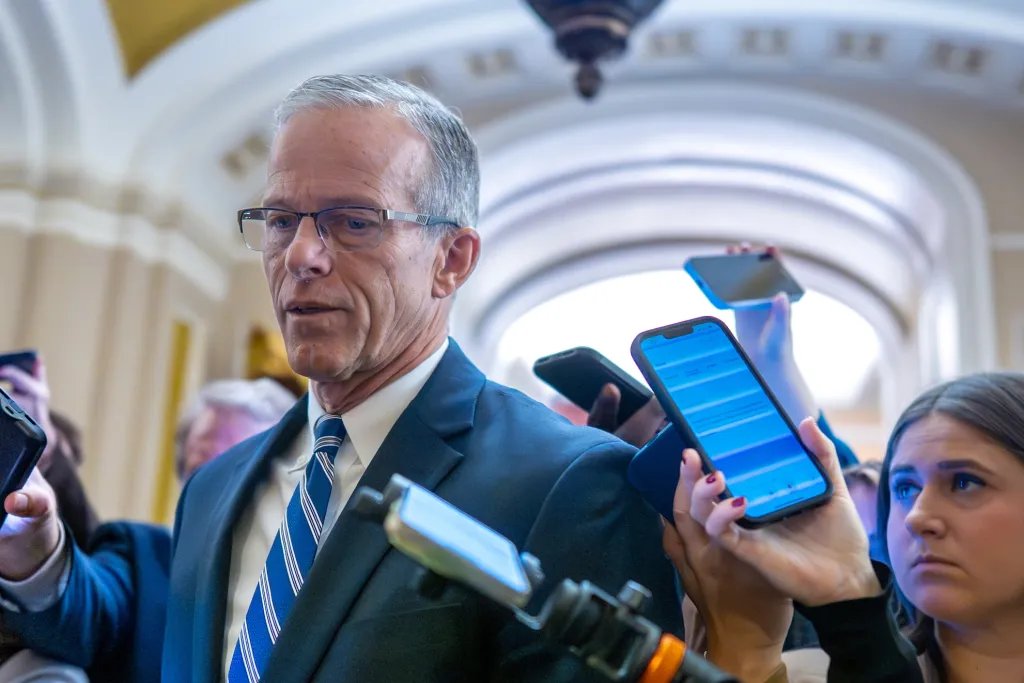After 14 failed votes and a 40-day-long shutdown, the Senate took its first step toward reopening the government on Sunday, with enough Democrats relenting on their healthcare demands to allow Republicans to overcome a filibuster.
The test vote, which took place during a rare weekend session, came shortly after Senate appropriators put the finishing touches on three full-year bills that would fund Veterans Affairs, Agriculture, and other federal departments.
The basic framework for a spending deal, attaching the three bills to a short-term extension for the rest of the government, is largely unchanged from what Republicans have been offering for weeks. The legislation does not include the extension of premium Obamacare subsidies Democrats have been demanding in exchange for their votes.
Instead, Republicans will allow a December vote on the subsidies, with no guarantee they can pass Congress or will be signed into law. As another concession, Republicans agreed to reverse thousands of planned layoffs the White House has announced since Oct. 1, when the shutdown first began, and prevent more from happening through January.
Sunday’s vote is just the first in a series of procedural hurdles that could draw the process out for days, unless all Democrats drop their objections to the funding plan. A group of centrist Senate Democrats reached a deal with Republicans on Sunday evening to overcome the filibuster’s 60-vote threshold, but most of the caucus remained opposed.
Just eight, the bare minimum needed for the measure to advance, voted for the funding bill: Sens. Dick Durbin (D-IL), John Fetterman (D-PA), Maggie Hassan (D-NH), Tim Kaine (D-VA), Angus King (I-ME), Catherine Cortez Masto (D-NV), Jacky Rosen (D-NV), and Jeanne Shaheen (D-NH).
Notably, Durbin, the minority whip, was the only member of Senate Democratic leadership to support the bill. Senate Minority Leader Chuck Schumer (D-NY) voted against, marking a break from March, when he joined centrist Democrats to keep the government open.
Sen. Jon Ossoff (D-GA), a vulnerable Senate Democrat seeking reelection in 2026, also voted “no.” On the GOP side, Sen. Rand Paul (R-KY) was the lone senator to buck leadership.
The government funding deal represents a long-awaited breakthrough for Republicans and a concrete sign that the government shutdown will end sometime this coming week.
Until now, only a few Senate Democrats were willing to break ranks with their leadership on the Obamacare subsidies, but mounting delays at airports and a lapse in food stamps benefits eventually became too much for more centrist members.
The Federal Aviation Administration required airlines to cut hundreds of flights due to staffing shortages on Friday, while Trump appears to have won a court battle over food stamps, ordering states to halt full payments for November.
Should the legislation ultimately pass the Senate, it would then return to the House, which has been out of session for well over a month. The House has already passed a short-term extension to Nov. 19, but the new funding patch would last until the end of January.
On Sunday afternoon, Minority Leader Hakeem Jeffries (D-NY) and other House Democrats came out against the funding bill, though he criticized Senate Republicans rather than his Democratic counterparts.
Republicans have said they are willing to negotiate a healthcare deal before the end of the year, when the enhanced Obamacare subsidies run out, but their refusal to commit to an extension has been the main stumbling block to reopening the government.
WHERE EVERY SENATE REPUBLICAN STANDS ON TRUMP’S CALL TO END THE FILIBUSTER
On Sunday, a bloc of Democratic senators who voted “yes” defended their decision in light of the prolonged shutdown and Republicans’ refusal to negotiate. Republicans have insisted that any funding deal be separate from policy debates.
“The question was, does the shutdown further the goal of achieving some needed support for the extension of the tax credits?” said King, an independent who caucuses with the Democrats. “Our judgment was that it would not produce that result, and the evidence for that was almost seven weeks of fruitless attempts to make that happen.”
Ramsey Touchberry contributed to this report.



